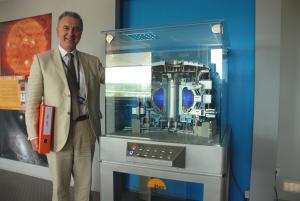The superconducting connection
1 Jul 2014
-
Sabina Griffith
Leader of the Magnet and Superconductor Group at CERN during the construction of the Large Hadron Collider, Professor Rossi is now charged with the particle collider's High Luminosity Upgrade, a project that he described to the ITER community on Tuesday, 24 June.
They have a lot in common: they are huge, they are powerful and they are superconducting. The blue dipoles that drive CERN's Large Hadron Collider (LHC) and the magnets under construction for ITER share many superlatives.
For this reason, the two international organizations signed a Cooperation Agreement in March 2008 that provides for cooperation in the design and manufacturing of superconducting magnets and associated technologies. CERN has also become the reference laboratory for the testing of ITER's superconducting strands.
Since its implementation in 2009 the collaboration has proven to be an outstanding example of high technology problem solving, with major inputs to the ITER magnets in the areas of superconductors, HTS current leads and high voltage testing.
On 24 June, the CERN-ITER collaboration steering committee came together at ITER Headquarters for its annual meeting, with CERN physicist Lucio Rossi presiding for the last time. He'll be handing the baton to colleague Miguel Jimenez, head of the Technology Department at CERN, in order to concentrate on his new assignment: the LHC High Luminosity Upgrade.
Professor Rossi presented the LHC upgrade project to the ITER community in a seminar titled "LHC: From construction to upgrade."


